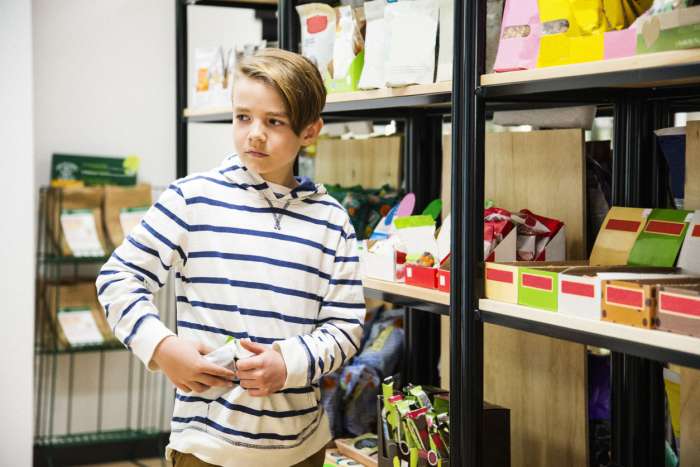Your five-year-old daughter asks you to buy her a candy bar, but you say no. “Today I’m just getting the groceries we need for the week. No candy,” you answer, calmly but firmly.
But when you get her into her car seat, you notice something shiny poking out from her pocket. Your face starts to feel hot as you realize what happened.
You take a moment to think through your options. You could launch right into a punishment, or you could ask her if she took anything from the store. You could march her right back inside to return the stolen item.
What’s the right way to handle this?
When younger kids steal, it’s important to discipline them in a firm, yet loving way. But what happens when older children who know better start shoplifting or taking things from others?
Stealing is usually a normal behavioral issue that many kids will do. How to respond to stealing depends on your child’s age and the specifics of the situation.
4 Discipline Strategies to Use With Highly Sensitive Kids
Being a parent is one of the most rewarding jobs on the planet and everyone who has the privilege of being a parent is truly lucky; however, it is not always easy. Usually, the most rewarding jobs come with hard work. Read More
Related: Why Is My Daughter Stealing?
If you’re worried your kid could become a bit of a kleptomaniac, don’t fear. Here are age-specific ideas for handling a child who takes something that is not theirs.
Why Do Kids Steal?
There are several reasons why children take things that do not belong to them. Younger kids may steal because they simply want something and they don’t have the self-control to stop themselves. It may be out of envy, revenge, or just a strong desire for an item. Or maybe they just don’t know any better.
As kids get older, they may steal out of envy, revenge, or desire too. But if it’s more than an isolated event, the bad behavior may be motivated by peer pressure, rebellion, or a desire to impress their peers. If the stealing behaviors seem to have come out of nowhere, there may be an underlying problem to address.
Kids who keep stealing even after several attempts to teach them not to may have something else going on. Experiencing trauma can lead to issues with impulse control or compulsive stealing.
Psychological Reasons for Stealing as a Child
Of course, stealing is an issue that many parents face with their children. While it can be a part of normal developmental behavior, frequent stealing can sometimes be an indicator of underlying psychological issues. It's important to understand these reasons to handle the situation appropriately and help the child navigate through their feelings.
Here are some psychological aspects that could explain stealing in children:
- Attention Seeking: Some children steal to get attention from their parents or peers. They might feel neglected or ignored and see stealing as a way to become the center of attention, even if it's negative.
- Impulse Control Disorders: Conditions like ADHD (Attention Deficit Hyperactivity Disorder) can cause impulsive behaviors, including stealing. Children with such disorders may find it hard to resist the urge to steal.
- Lack of Understanding: Younger children may not fully comprehend the concept of ownership and may take things that do not belong to them without realizing it's wrong.
- Peer Pressure: Sometimes, children steal to fit in with their friends or because they are dared to do so. They fear being ostracized or ridiculed by their peers if they don't comply.
- Low Self-esteem: Children with low self-esteem may steal to gain approval or admiration from others. They might believe that having certain items will make them more likable or popular.
- Dealing with Stress or Trauma: Stealing can be a coping mechanism for children dealing with stress, trauma, or significant changes in their lives, such as a divorce or a move.
- Materialism and Envy: In a society where material possessions are often equated with success, children might steal out of envy or the desire to have what others have.
Understanding these psychological reasons can help parents and caregivers address the root cause of the problem and provide the necessary support for their child. If the stealing continues or is accompanied by other concerning behaviors, it may be beneficial to seek professional help from a child psychologist or psychiatrist.
What to Do When Young Children Steal

Let’s start with the youngest kids — toddlers and preschoolers. If a two or three-year-old takes something from a store or from their sibling, their parents need to very clearly tell them that we do not take things from others without permission.
In the case of a store, we need to buy it, and the adult needs to say “yes.”
Have them put the item back, or take it from them and give it back yourself. That’s it though. No punishment or later consequences are required.
Remember that discipline means “to teach.” At this developmental stage, your child is still learning about ownership and permission. Keep it simple and don’t get mad. But, remember to be consistent. If you don’t want them stealing as they grow older, make sure not to allow it now.
As kids get into elementary school, it’s important to have a more serious discussion about why stealing is wrong. Anything that your child takes from a place of business you should require them to return.
The sales associate or manager may choose to have a word with them, and that’s actually ideal. Regardless, make sure to have your own conversation about why it’s not OK to take something without paying for it.
If your child is taking things from other kids’ backpacks or a friend’s house, it may actually be wise to keep the communication between the parents or teachers involved. It can be best to avoid ongoing drama between kids and have them put it back. Parents and teachers should both speak to the child about the misbehavior privately.
In the case of taking things from family members, you may wish to have your kid return the items to the person and do some kind of restitution, such as an apology note.
Refrain from trying to scare your child by telling them they could go to jail or saying that they are a bad kid. This is not necessary and it is likely to do more harm than good. Focus on the present moment and the moral lesson you want to teach.
Often, kids won’t steal after the first time if you have responded seriously. But, some kids will keep taking things. Repetitive stealing may have a deeper root cause.
It’s important to seek professional help if you can’t identify the root cause or if you don’t know how to stop the behavior. Increasingly harsh punishments are not likely to help a young child who is struggling emotionally.
Can I Call the Police if My Child Is Stealing From Me?

Teens and preteens generally understand that stealing is not OK. They know right from wrong, yet kids at this age do steal. Teens might steal to rebel or impress their peers.
They may enjoy the thrill, or they may be suffering from low self-esteem. In many cases, it’s a phase, but that doesn’t mean you should just wait for it to pass.
If you find out that your child has been stealing, it’s important to have a serious conversation about both the moral reasons to not steal and the legal implications. If your child is caught stealing and the police are called, try to stay calm.
They are still minors and this won’t go on their record. An arrest might actually be an effective natural consequence. It could be better for them to learn their lesson now than when they are older and it would stay on their record.
If your teen has stolen money or items from you, focus on trust in your conversation with them afterward. Let them make amends or pay you back (in cash or with extra chores).
Just like with young children, you are not going to solve this behavior problem by yelling really loud or taking away all of your child’s privileges. However, it’s fair to limit their freedom if you don’t feel like you can trust them. Make sure you have a plan in place for them to earn your trust back though.
What To Do When Your Child Steals, as Parents
You can teach your kids from a young age that there are items that belong to others. Keep your language positive. Say “That is Sarah’s scooter,” instead of “That’s not yours.”
Try to take your little one to the store with you at least some of the time. This is a good place to talk about paying for things. With toddlers it’s to keep it simple — we have to pay for the groceries before we can take them home. As your kids grow you can begin to have conversations about livelihood. You can tell them a simplified version of the consumerism chain.
When buying milk, for example, you can talk about how the farmer needs to feed his family, so he sells the milk to the store. The store owner needs to feed his family, so he sells the milk to us. This is a good way to start to build an understanding of society’s structure, and why stealing is considered a bad thing.
Older kids can understand the golden rule too — Do unto others as you would have others do unto you. Ask them how they would feel if someone took something from them without their permission.
Teens and tweens are developing their own moral compass and their sense of justice. Talk to them about the kind of person they want to be, and what that person would do in situations. You can also delve into trust and accountability with teens.
They want your trust, and they want more independence and responsibilities. Talk about how freedom and responsibility are related. Shoplifting or taking money from their parents doesn’t demonstrate that they can be trusted to handle more freedom.
Stealing From Family Versus a Store

You might be wondering if you should handle stealing from a store differently from stealing from a family member or friend. The moral conversation is basically the same in both cases. It’s wrong to take something that doesn’t belong to you. We live in a society where ownership exists and we respect others’ possessions.
Your conversation about a store owner needing to support his family might be slightly different from your discussion about respecting siblings’ possessions. But the overarching idea is that we don’t take without permission or payment.
That being said, at a store, things are a bit less personal. Stealing from a store is also punishable by law. It’s important that your child knows that, even if they are in elementary school.
Is Stealing a Phase Kids Go Through?
Stealing can be a phase, especially for teens who might steal money, liquor or other things they aren’t supposed to have. Young kids may also go through a stealing phase when they are testing limits and learning what they can and cannot get away with.
But just because it’s a phase does not mean that you should just let it pass. It’s important to take a stand and be firm about your family values. This helps kids — from toddlers to teens — feel safe and secure.
You should address stealing firmly and immediately. The fact that it could be a phase may comfort you, as the parent. But you still need to respond to it.
Your child needs to know that you oppose stealing and that you won’t let it slide. Otherwise, it may no longer be a phase.
What If My Child Keeps Stealing?
If you’re reading this article because you have already tried to discipline your kid for stealing but they keep doing it, take a deep breath. You are not alone. Some children steal due to underlying issues and they need a completely different approach.
When stealing is a serious problem children may have experienced trauma. In this case, it’s important to work with a mental health professional to address the underlying issues.
Stealing may be a trauma response for children who have been abused or experienced challenging living conditions, such as foster children. They may steal compulsively as a subconscious way to make sure they have what they need to be safe. They may have lost everything and feel compelled to collect what they can.
It is still important to make a statement to your child that stealing is not OK and that stolen goods must be returned. In some cases, privileges might need to be revoked if you can’t trust your kid.
That being said, a little bit of compassion goes a long way when there is a more serious problem present.
Switch your mindset away from punishment or force. Your goal shouldn’t be to make them feel bad — they already do. You want to be someone who is there for them.
For younger kids, continue to reinforce your expectations. With older kids, tell them that you love them and this behavior is not OK, and you are going to help them.



